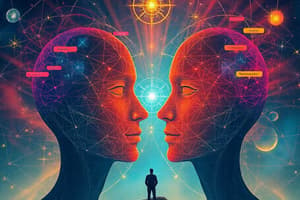Podcast
Questions and Answers
According to Berne's Transactional Analysis, what three distinct states of being can be observed in an individual's behavior?
According to Berne's Transactional Analysis, what three distinct states of being can be observed in an individual's behavior?
Parent, Adult, and Child.
In Transactional Analysis, how does Berne describe the 'Parent' state, and what is its primary source of data?
In Transactional Analysis, how does Berne describe the 'Parent' state, and what is its primary source of data?
A collection of recordings of unquestioned or imposed external events perceived in early life, mainly from the example and pronouncements of real parents or parent substitutes.
How does the text describe data within the Parent state being recorded?
How does the text describe data within the Parent state being recorded?
The data is taken in and recorded 'straight' without editing.
How does the 'Child' state differ from the 'Parent' state in Transactional Analysis?
How does the 'Child' state differ from the 'Parent' state in Transactional Analysis?
What is the predominant by-product of the 'civilizing' or frustrating process in the development of the 'Child' state, according to the text?
What is the predominant by-product of the 'civilizing' or frustrating process in the development of the 'Child' state, according to the text?
What marks the beginning of the 'Adult' state in a child's development, according to Berne?
What marks the beginning of the 'Adult' state in a child's development, according to Berne?
How does the 'Adult' state develop a 'thought concept' of life, and how does this this contrast with the Parent?
How does the 'Adult' state develop a 'thought concept' of life, and how does this this contrast with the Parent?
What are the three sources of information that the 'Adult' state uses to make decisions?
What are the three sources of information that the 'Adult' state uses to make decisions?
What is one of the important functions of the Adult state of being?
What is one of the important functions of the Adult state of being?
Adult data accumulates as a result of what ability of the child?
Adult data accumulates as a result of what ability of the child?
What does the text mean when it discussed the Adult capacity for probability estimating?
What does the text mean when it discussed the Adult capacity for probability estimating?
Since the little person has no vocabulary, what are most of the early reactions?
Since the little person has no vocabulary, what are most of the early reactions?
What two things does the child need the adult state to be in order to be more creative?
What two things does the child need the adult state to be in order to be more creative?
How does the text define contamination of the Adult?
How does the text define contamination of the Adult?
What does it mean when the text says that 'cops are bad' as truth?
What does it mean when the text says that 'cops are bad' as truth?
Explain how early experiences, particularly within the first five years of life, contribute to shaping the Parent state.
Explain how early experiences, particularly within the first five years of life, contribute to shaping the Parent state.
Explain the analogy of stereophonic sound related to the Parent state. What does it mean if they are not harmonious?
Explain the analogy of stereophonic sound related to the Parent state. What does it mean if they are not harmonious?
What does being a small child also mean?
What does being a small child also mean?
If the Adult becomes impaired, how does the text describe the person feeling?
If the Adult becomes impaired, how does the text describe the person feeling?
How, according to Transactional Analysis, can individuals begin to 'get off the hook of the past'?
How, according to Transactional Analysis, can individuals begin to 'get off the hook of the past'?
Flashcards
Transactional Analysis Changes
Transactional Analysis Changes
Simultaneous changes in facial expression, vocabulary, gestures, posture, and body functions.
The Parent State
The Parent State
A state of being that involves behavior which is a reproduction of what the patient saw and heard his parents do.
The Child State
The Child State
A state of being with manner, appearance, words and gestures that reflects a younger emotional state.
Recordings in the Parent
Recordings in the Parent
Signup and view all the flashcards
Recordings in the Child
Recordings in the Child
Signup and view all the flashcards
Defining 'the Child' State
Defining 'the Child' State
Signup and view all the flashcards
The Adult State
The Adult State
Signup and view all the flashcards
Building the Adult State
Building the Adult State
Signup and view all the flashcards
The Adult as a Computer
The Adult as a Computer
Signup and view all the flashcards
Work of the Adult
Work of the Adult
Signup and view all the flashcards
Study Notes
- Transactional Analysis identifies three ego states: Parent, Adult, and Child.
- These states represent different patterns of behavior, thoughts, and feelings.
- People can shift between these states, exhibiting changes in expression, vocabulary, gestures, posture, and bodily functions.
Early Observations
- Berne observed that people seem to change before your eyes, showing simultaneous changes in expression, vocabulary, and body functions.
- These changes can be observed in everyday situations.
The Discovery of the Ego States
- Berne's work was inspired by observing a patient who sometimes acted like a lawyer and sometimes like a little boy.
- This led to the identification of the 'adult' and 'child' states.
- A third state, the 'parent', was later identified.
- These states are apparent in manner, appearance, and gestures.
- A woman's varying behaviors during a session illustrated the three distinct personalities: a feeling-dominated child, a self-righteous parent, and a reasoning adult.
The Parent Ego State
- The Parent ego state contains recordings of unquestioned external events perceived in early childhood (roughly the first five years).
- These recordings come from the example and pronouncements of the child's own parents or parent substitutes.
- The Parent state houses everything a child sees and hears their parents do and say.
- Hostility between parents, admonitions, rules, and laws are all recorded in the Parent.
- Positive experiences and pronouncements are also recorded.
- These recordings are taken in "straight" without editing due to the child's dependency and inability to modify them.
- The recordings are permanent and available for replay throughout life.
- Parental dictates are an indispensable aid to survival.
- The inconsistent behaviors are also recorded creating confusion which the child defends against by turning off the recording.
- The Parent state can contain conflicting material leading to repression and fragmentation.
- Parent data appears in current living in the "how-to" category.
- Television programs can become a source of Parent data.
- External situations where children feel dependent also contribute to the Parent state.
The Child Ego State
- The Child ego state records internal events, the responses of the little person to what they see and hear.
- These reactions are primarily feelings since the child lacks vocabulary.
- The child is small, dependent and inept.
- There are infinite demands on the child.
- The civilizing process creates frustration and negative feelings.
- ‘I'm not OK’ is a common self-estimate.
- This feeling is permanent and cannot be erased.
- Childhood experiences can be replayed in current transactions.
- When a person is dominated by feelings, their 'Child' is said to be in command.
- The Child also contains creativity, curiosity, the urge to explore, and pristine feelings of first discoveries.
- An example of childhood feelings towards parents made by a seven-year-old was "Daddy, when I have an OK Daddy and an ok Mama, how come I'm not OK?"
Development of Ego States Over Time
- By the time a child leaves home for school, the Parent and Child states are largely formed.
- Parental influence continues to reinforce these states.
- It is difficult to imagine an emotion not felt in its most intense form by age five.
The Adult Ego State
- Around ten months old, a remarkable thing begins to happen to the child.
- The Adult ego state begins to develop as the child starts to experience the power of locomotion which grants motility and freedom.
- The Adult develops a 'thought concept' of life based on data gathering and data processing, differentiating itself from the Parent and Child.
- The Adult state is fragile and can be 'knocked out' by Parent commands and Child fears.
- The Adult transforms stimuli into pieces of information, processing and filing it.
- The Adult begins to distinguish life as taught (Parent), as felt (Child), and as figured out by themselves.
- The Adult is a data-processing computer that makes decisions after considering information from the Parent, Child, and gathered data.
- The Adult examines Parent data for truth and applicability and Child data for appropriateness.
- The goal is not to eliminate the Parent and Child, but to be able to examine them freely.
- Secure youngsters find that most Parent data are reliable.
- If parental directives are grounded in reality, the child will come to realize integrity.
- The verification of Parent data does not erase the NOT OK recordings in the Child.
- The Adult updates Parent data to determine what is valid and Child data to determine which feelings may be expressed safely.
- Probability estimating is another function of the Adult which is slow in developing.
- The Adult estimates probabilities.
Functioning of the Ego States
- Under stress, the Adult can be impaired, leading to inappropriate emotions.
- The boundaries between Parent, Adult, and Child are fragile.
- Incoming signals that recreate childhood situations can be overwhelming.
- A traumatic neurosis signal hits the Parent and the Child at the same time it hits the Adult.
- The Child responds with a NOT OK feeling, leading to regression.
- Catering to the helpless Child delays the process of restoring the Adult to the executive function.
- The ongoing work of the Adult involves checking out old data and refiling it for future use.
- Creativity is born from curiosity in the Child and the Adult.
- The Child provides the "want to" (motivation), and the Adult provides the "how to" (skill).
- A youngster has more time to be creative if he is not wasting time in futile decision making for which he has inadequate data.
- Conflict uses a great deal of computer time.
- An extremely time-consuming conflict is produced when what parents say is true does not seem to be true to the Adult.
- One example of what can happen when there is conflict between perceived or taught prejudice against cops is described.
- This is called contamination of the Adult.
Studying That Suits You
Use AI to generate personalized quizzes and flashcards to suit your learning preferences.




